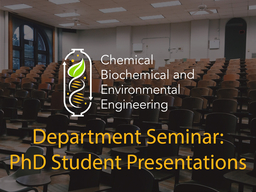CBEE Seminar: Mandar Bokare & David Burgenson
CBEE PhD Student Seminars
Location
Engineering : 027
Date & Time
November 18, 2019, 12:00 pm – 1:00 pm
Description
Tracking chemical activity of hydrophobic organic pollutants allows identification and management of most impactful sources.
Mandar Bokare
Ph.D. Student, Dept of Chemical, Biochemical and Environmental Engineering
Abstract:
Bioaccumulation of hydrophobic organic pollutants such as polychlorinated biphenyls (PCBs) in aquatic organisms is a major pathway for exposure to humans. Uptake of these chemicals in the aquatic food web is governed by the chemical activity in surface water and sediments. The freely dissolved concentration of pollutants in these phases has been shown to be directly related to their chemical activity and can be used to accurately predict bioaccumulation. In large environmental systems such as rivers, the freely dissolved concentration is governed by mass transfer of pollutants across the air-water and sediment-water interfaces as well as direct inputs from tributaries and overflows. Differences in chemical activity govern the direction of these mass transfer processes as well as the impact of direct inputs on the receiving water body.
This research demonstrates the use of a novel passive sampling approach for time-integrated measurement of freely dissolved concentrations of pollutants in the water and sediment phases, as well as gas phase measurements. The measurements performed in the Anacostia River were able to provide the first accurate mass balance of freely dissolved pollutant concentrations in the river. The findings are challenging the traditional approach of using total mass loading of pollutants as a way to assess management options, and instead directing greater focus on sources that raise chemical activity of the pollutants in the river and cause negative impacts through bioaccumulation in the food web.
Bio:
Mandar Bokare is currently a PhD Candidate in Environmental Engineering at CBEE. He joined Dr. Upal Ghosh’s research group at UMBC in 2016, where his research focuses on application of novel passive sampling techniques to understand the fate and transport of hydrophobic organic contaminants in environmental systems and linking these transport processes to subsequent bioaccumulation of these contaminants in aquatic food-web. Mandar obtained his Bachelor’s degree in Chemical Engineering from National Institute of Technology, Nagpur (India) in 2010 and his Master’s degree in Environment and Sustainable Technology from University of Manchester (United Kingdom) in 2012. Before joining UMBC, Mandar worked as a Project Research Assistant at National Environmental Engineering Research Institute (NEERI, India) from 2013 to 2016.
His honors and awards include:
- Honorable Mention, 2019 Student E-Poster Competition, American Association for Advancement of Science (AAAS), Environment and Ecology category;
- 1st place in Geosyntec 2019 Sediments Student Paper Competition and 2nd place,
- Best Student Platform Presentation, SETAC Chesapeake Potomac Regional Chapter Annual Spring Meeting, Fredericksburg, VA. April 2018.
Development of a Human Primary Cell Free Protein Expression System Derived from Human Blood
David Burgenson
Ph.D. Student, Dept of Chemical, Biochemical and Environmental Engineering
Abstract:
Cell free translation is a technology that has traditionally had many applications in aiding in the discovery of many basic science concepts such as the discovery of the codon and reconstructing the mechanisms of translation. Recent advances in cell free translation have broadened the scope of applications to include proteomics and manufacturing. While most cell free protein expression systems are derived from continuous cell lines, one of the first and most well-established eukaryotic cell free translation systems used primary cells harvested from rabbits as a source of raw material. While this system has many merits, there have been limitations identified due to the nature of the cells used as a raw material. A cell free expression system derived from human primary cells has many potential applications in personalized medicine and diagnostics, as well as traditional basic science applications. While the yield of this system is currently relatively low, recent advances in immunotherapy provide techniques and knowledge that may aid in the development of this system. We will present data from the development of this system.,/p>
Bio:
David obtained his undergraduate degree from UMBC in Chemical Engineering in 2017. As a third year undergraduate student, he began research at the Center for Advanced Sensor Technology (CAST) as a member of the protein expression team working on the Defense Advanced Research Projects Agency (DARPA) Biologically Derived Medicines on Demand (Bio-MOD) program. This research eventually transferred to his graduate studies, where he is currently a third year PhD student at CAST under Dr, Govind Rao.
